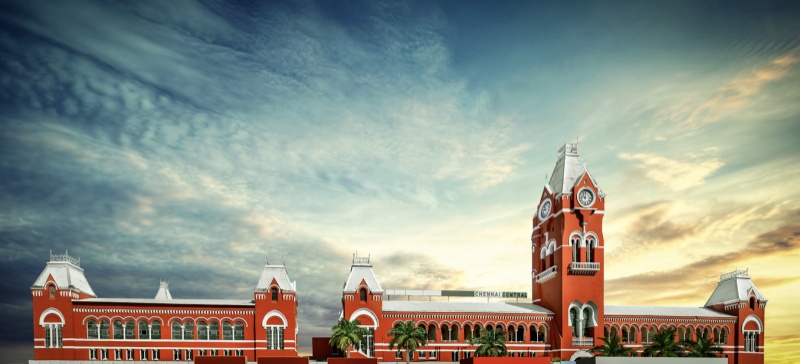
Chennai has forever been known for its local textile production and spices, which drew the British companies closer to the city. Although British traders were first attracted to the city as a probable economic centre in the early 1600s, the ties of international merchants to the businesses in Madras had been knotted in the 4th century BC itself when business relations were being established between various merchants all across Western Asia.
The Journey from Madras to Chennai
Chennai was known as Madras until 1996 - the shortened name for Madraspatnam. It was inhabited by Armenian and Portuguese traders in the 17th century, after which the British arrived and set up a fort and a factory. At that time, cotton weaving was the local industry.
Madras gained prominence in the British network of maritime trade routes that were used to export locally produced chintz and cotton, different spices and other imported cargoes from the east from the 17th century onwards.
For centuries, Madras was the pivotal port in the trading routes that crossed the Bay of Bengal. This role got it the name Gateway of South India. It has for long served the dual purpose of a resting place for merchants from the Spice Islands on their journey to the west and as a significant centre for economic and cultural activity.
Chennai: The Cultural Capital of South India

Located on the Coromandel coast in Southeast Asia, Chennai is the capital of Tamil Nadu. Besides being a central commercial hub, Madras grew into a melting pot where different cultures and religions came together to give it its unique culture.
Indian, Armenian, British, Portuguese, Dutch and French traders came to this major port at the Maritime Silk Roads for trade activities. Also, they exchanged cultures that gave shape to the culture of the city. The city is home to over 600 Hindu temples with distinct 17th-century porticos, neo-classical British Architecture or Indian Mughal style, or an amalgamation. Also, the first British Church was built in Madras.
Southeast India has a lengthy and well-established history of trade and exchange with many countries. Chennai also witnessed a treasure of business ideas being exchanged while experiencing a well-endowed fusion culture that made Chennai a universal business centre. In this way, the city's expansion of business and trade was pushed by maritime trade and stimulated by the global interchange of products and the multicultural public.
Today, Chennai hosts the annual Madras Music Season - a sizeable cultural event, a centre for theatre and classical dances, such as the Bharatnatyam. It is home to India’s second-largest movie industry Kollywood.
The Current Economy of the Gateway of South
Many industrial and technical-oriented businesses flourished in Chennai, which helped shape it into the leading metro city today. From Madras to Chennai — the city's industrial landscape has undergone evident changes in the last few decades. From the early 1950s to the 1980s, the city was prominently active in business areas such as engineering, manufacturing, and automobiles and production. It is currently witnessing a boom in new-age entrepreneurship and startups in artificial intelligence, aerospace, banking and finance and Software As a Service (SaaS).
The Industrial Base: Chennai is divided into four broad zones, namely, North, South, Central and West. The region of North Chennai is predominantly an industrial area, while the Southern and Western regions are also undergoing rapid commercialization. Information Technology (IT) and financial services, especially fintech, are the reasons behind the active commercialization of the state. The major industries in Chennai include technology and IT services, hardware, automobile, manufacturing, and healthcare.
IT services: It is the second-largest exporter of software, IT and IT-enabled services. The automobile industry in India is based majorly in Chennai alone. The major names in software and software services in Chennai include Cognizant, Accenture, Hewlett Packard Enterprise, and Wipro.
Electronics and Automotives: Chennai has evolved into an electronic manufacturing hub in recent years. MNCs like Dell, Samsung, Cisco, and Motorola have set up their manufacturing plants here. With a 60% share in automotive exports, it is often tagged as the Detroit of South Asia. It has a 30% share in the total electronic manufacturing in India.
Banking and Financial Services: Bank of Madras, one of the oldest banks in Indian history and was started by the British in 1843, is the first modern bank in Chennai. Being the hub of economic activity, Chennai houses banks such as Arbuthnot & Co, Bank of Chettinad, Bank of Madurai, etc.
Aerospace: Chennai Aero Park will become the largest integrated aerospace ecosystem in the world. It integrates Aerospace design, manufacturing and maintenance units into a single park and marks India’s entry into the global aerospace scene. The park will facilitate designing and manufacturing aircraft for civil and defence needs in the near future.
Health Tourism: The health capital of India - Chennai has the 36th largest urban area in the world and is one of the most visited cities in India. In South India, Chennai is considered one of the biggest centres for education, culture, and economic activities. Health Tourism, a unique amalgamation of tourism and healthcare, is a unique feature of the state’s tourism industry. As much as 45% of the health tourists head over to Chennai in India.
Finance as a software service: For ten years, the city harboured many unconventional enterprises, including SaaS (Software-as-a-service). Today, Chennai is considered the SaaS capital of India, as most of the company startups in Chennai are SaaS companies which constitute a fourth of the national figure. Chennai has lent support to several advanced companies like Zoho and Freshworks, which have become the biggest success stories and business ideals in the world of Indian SaaS companies have earned millions of dollars in revenue.
As India is on a journey to make Fintech applications more approachable to people, the Tamil Nadu government is on a path to create an ecosystem in FinTech through varied projects to attract domestic and international financial institutions and make Chennai one of the leading global financial services centres. It will be developed with the crucial supporting infrastructures and networks to accommodate financial structures such as banks, neo banks, non-banking financial services, etc, to create a strong individual financial market. The skilled and trained in Chennai and the government are coming together to regulate ways to create an ecosystem. To name a few, leading fintech companies solely based in Chennai are- BankBazaar, Vivriti Capital, Funds India etc.
The definition of Business in Chennai has changed over the years. There has been a focal shift in the matters of startups from trade and textile production to Neobanks and fintech companies. The focal shift has enhanced the multicultural foundation in Chennai. The heady mix of cultural, social, and financial factors has lent Chennai the inertia to withstand any risk and keep attaining future business milestones.


